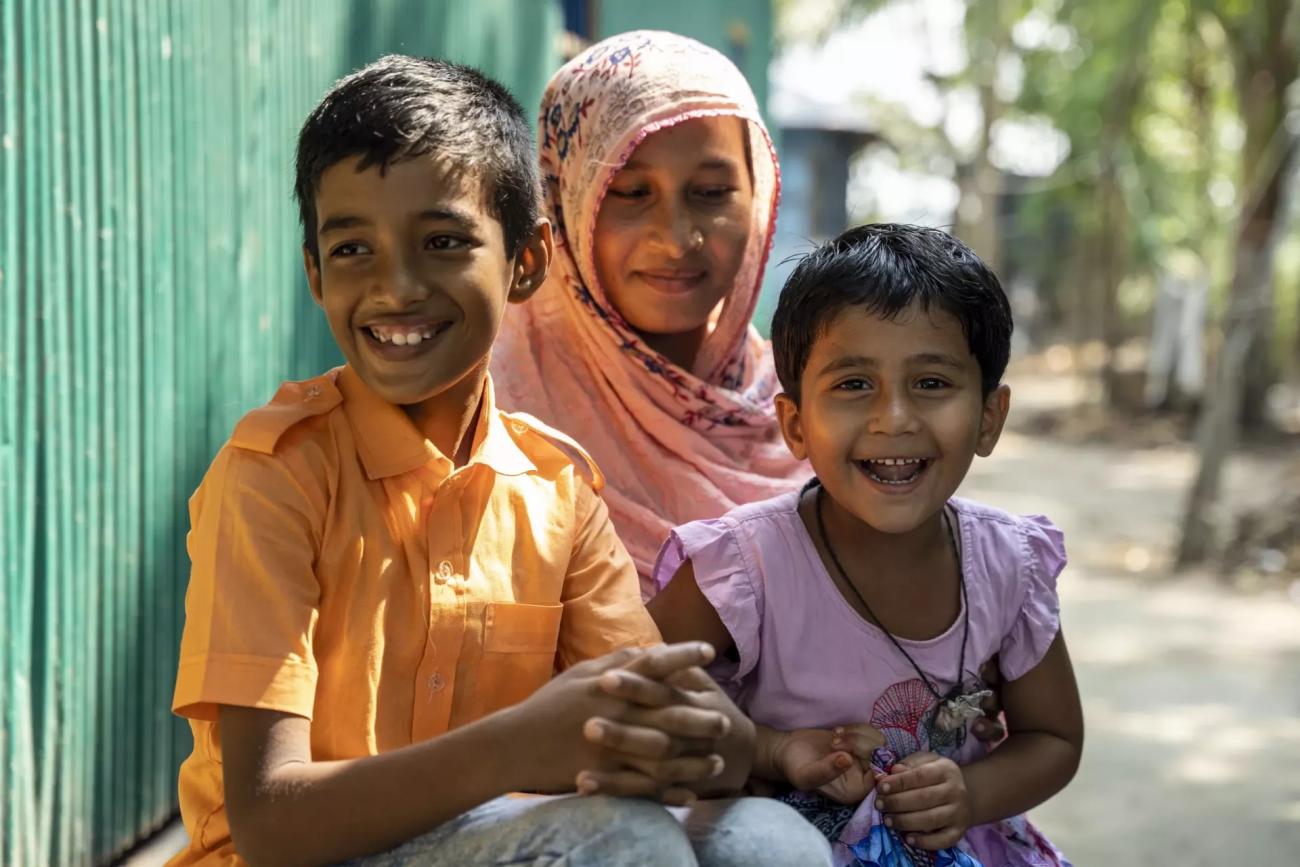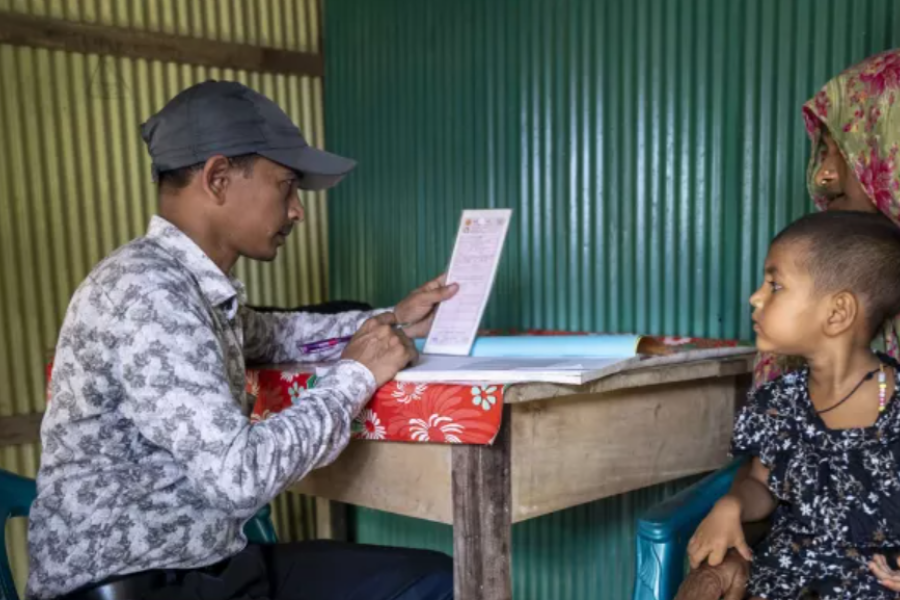UNICEF’s Vitamin A Supplementation programme achieved 100% coverage reaching vulnerable children aged 6-59 months living in Hard-to-Reach (HTR) areas across Bangladesh

Boosting immunity of children living in hard-to-reach communities
27 June 2024: Bhola, located in the southern region of Bangladesh, is a district characterized by its riverine landscape and intricate network of waterways. Situated near the eastern coast of the Bay of Bengal, Bhola experiences a tropical monsoon climate and faces accessibility challenges.
In 2019, Bangladesh Cabinet Division declared 42 upazilas under 14 districts as Hard-to-Reach (HTR) areas. The Manpura island in Bhola is one of them. In Manpura, accessing healthcare services presents a significant challenge due to its geographical location and limited infrastructure. Manpura is difficult to reach, especially during adverse weather conditions. Its residents have to travel a considerable distance either on foot, crossing makeshift bamboo bridges, or have to take boats, to get to the nearest healthcare facility.
Inadequate infrastructure together with the adverse impacts of climate change, and the lack of awareness about essential health services like Vitamin A supplementation only exacerbate the existing challenges for the children living on this island.
Vitamin A is essential for children's growth and development. Global evidence suggests that Vitamin A improves a child’s chance of survival by bolstering the immune system, helping protect from life-threatening infections like measles and diarrheal disease, and vision and bone growth.
Keeping children healthy
Jhumur, a mother of two, lives in the Daserhat village of Manpura. While her youngest daughter, Mariam, aged 4, received the required Vitamin A doses, her 9-year-old son, Alif, did not. Reflecting on her experience, Jhumur shared, "My son did not receive Vitamin A because we were not aware of its importance. Watching him suffer from night blindness is heartbreaking. He also falls ill frequently and takes a long time to recover. If only we had known the importance of Vitamin A sooner, he would not have to go through this pain."
Since 2022, UNICEF, together with National Nutrition Services (NNS)/Institute of Public Health Nutrition (IPHN), has been actively engaged in addressing the crucial need for Vitamin A supplementation among children in hard-to-reach areas like Manpura. Collaborating closely with community healthcare workers and volunteers, UNICEF has made significant strides in delivering essential health and nutrition services to the children in these communities. In 2023, 150,702 children, aged 6 – 59 months, across 51 hard-to-reach areas and 193,389 in 2023, across 66 hard-to-reach areas, were provided with Vitamin A Supplementation.
The programme implemented strategies such as door-to-door awareness campaigns, listing eligible children, enlightening parents about the critical role of Vitamin A in a child's health. Additionally, microphone announcements were made through the streets of Manpura, specifying dates and locations where children would receive Vitamin A supplementation. This served as a vital tool in reaching out to families, urging them to participate in this life-saving initiative. By consolidating distribution points to a central location within each locality, the campaign ensured that no child was left behind as it also eased the difficulties of parents who no longer had to travel long distances to access Vitamin A supplementation for their child.
An integrated approach to nourishment
Before 2022, the lack of information about eligible children for Vitamin A Supplementation made it exceedingly difficult to track them, as registers or lists of recipients were not maintained in the healthcare centers. Parents often failed to bring their children for subsequent doses and tracking them was nearly impossible. After UNICEF introduced the Growth Monitoring and Promotion (GMP) card in 2022, tracking efforts were revolutionized, enabling healthcare workers to identify and reach out to families whose children had missed their doses. Healthcare workers and volunteers record the child’s name, age, address, and parents’ name along with the progress of Vitamin A supplementation on the GMP card. This allows them to easily contact the children's families if they miss a dosage. GMP cards also indicate whether child is fully immunized with two biannual doses of VAS or not. Jhumur ’s daughter’s GMP card showed that she received all four doses of VAS in the last two years (2022-2023), indicating that she is covered with two doses of VAS annually.
In collaboration with the NNS/IPHN, UNICEF also organized a comprehensive training session for more than 1200 healthcare workers and volunteers from 17 upazilas under 5 districts. "Even as a healthcare worker, I was not fully aware of the severe consequences of missing Vitamin A supplementation. The training session equipped us with in-depth knowledge about the critical importance of Vitamin A. Understanding the health implications of Vitamin A deficiency and the types of Vitamin A-enriched food is vital for enlightening the community,” said Moloy Kumar, a healthcare worker from Manpura.
A healthier future for children
With an expanded understanding of the subject, healthcare workers like Moloy adeptly addressed concerns and superstitions regarding the supplementation, gradually earning the trust of even the most skeptical individuals within the community. Through community engagement sessions and courtyard meetings, participants like Jhumur and other parents from Manpura gained valuable insights into the symptoms of Vitamin A deficiency, including dry skin and eyes, night blindness, and delayed growth - knowledge that was previously elusive to them. Furthermore, they learned about the natural sources of Vitamin A, benefits of Vitamin A supplementation, particularly its role in strengthening the immune system, safeguarding against various diseases and infections.
"I did not know much about nutritional deficiency and consequences of Vitamin A deficiencies before. The healthcare workers came to my village and talked about vitamins, explained why it is crucial to take supplements, and also told us to eat food rich in vitamins," said Jhumur. “Mariam is growing up as a healthy and active child, thanks to the Vitamin A supplementation. I am happy to gain knowledge about the benefits Vitamin A can give my children in terms of a better immune system and overall well-being. I also actively share the knowledge with my neighbors and encourage them to get the supplementation,” concluded Jhumur.
Jhumur’s daughter is an example of children who had never been reached with Vitamin A supplementation before in Manpura, but is now benefiting from this vital intervention, with the support from UNICEF. By focusing on expanding coverage in the most hard-to-reach areas, the campaign achieved 100% coverage of children in these areas. UNICEF continues to advocate for increased accessibility and quality of nutrition services, including Vitamin A supplementation, ensuring that all children can benefit from essential nutrition interventions and thrive.











